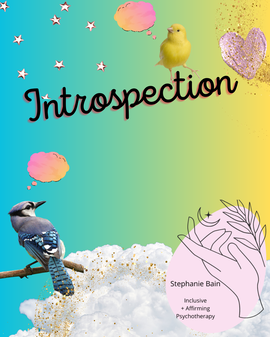|
As a therapist in Oakland, CA, a consistent goal of both individual and couples therapy is increasing the ability to be introspective and to generally encourage introspection in understanding how you make choices and how you experience yourself in relationships. How important is learning the skill of introspection in therapy? Introspection: What is It? Introspection is the process of examining and reflecting upon one's own thoughts, feelings, and mental experiences. It's a cognitive and psychological process that involves looking inward and gaining self-awareness about one's thoughts, emotions, motivations, and perceptions. Introspection often involves contemplating your own mental states and attempting to understand the underlying reasons for your thoughts and behaviors. Introspection is all about looking inside yourself and reflecting on your own thoughts. Introspection is all about getting real with your inner thoughts and feelings. For examples, you take a moment to think about why you're thinking what you're thinking and, why you're feeling the way you're feeling. 🧐 Introspection is a fundamental aspect of self-awareness and self-understanding and is super important for figuring out your own identity, making choices, and regulating your emotions. Introspection in Psychotherapy Introspection serves as a valuable tool in the therapeutic process, aiding clients in gaining deeper self-awareness and understanding of their thoughts, emotions, and behaviors. Introspection enables individuals to identify patterns and connections within their cognitive and emotional experiences. By examining these patterns, clients can unravel the underlying causes and motivations for their reactions, leading to insights that might not have been immediately apparent. This process is akin to uncovering the layers of one's psyche, facilitating a comprehensive comprehension of oneself. Cool. 😎 Furthermore, introspection is instrumental in addressing the "why" questions that often arise in therapeutic contexts. Clients can explore why certain situations trigger specific emotional responses or why they engage in particular behaviors. This introspective exploration empowers individuals to uncover root causes, enabling them to address these aspects constructively. During challenging times, introspection becomes a coping mechanism. Clients can apply the self-reflective skills they've honed to navigate stressors and manage emotions in healthier ways. Introspection inherently requires a pause before reacting and create room for conscious choice. Therapists guide clients through this introspective journey, providing guidance and perspective as clients delve into their internal landscapes. Introspection's Limits The ability to introspect is SO useful, but there is more needed to make changes in your life. Emotions can be powerful drivers of behavior. Even if you're aware of a certain pattern, intense emotions or stressors might still push you to revert to old habits, despite your intentions. You also have to feel stuff... Feeling feelings, rather than just relying on introspection and analysis, is a critical aspect of the therapeutic process. Emotions are valuable sources of information about our internal experiences and reactions. They provide insights into underlying needs, desires, and unresolved issues. Engaging with emotions helps clients understand the root causes of their struggles, facilitating a deeper level of self-awareness. Allowing oneself to feel and express emotions can provide a sense of relief and catharsis. Repressed or unacknowledged emotions can contribute to psychological distress. Through emotional expression, clients release pent-up feelings and experience a sense of release, which contributes to healing. Trauma, Triggers, and Unconscious Stuff Have you ever introspected over your own shitty behavior or response? Have you watched yourself in slow motion make poor decisions. Yeah, introspection is not enough. Emotions, thoughts, environments, and experiences can cause triggers or set off habitual patterns where we have less control than we want. Trauma triggers can lead to relapses or setbacks in behavior change efforts. Exposure to triggers might temporarily overwhelm individuals, causing them to revert to previous patterns as a way of coping. Sometimes, people might inadvertently sabotage their own efforts to change due to feelings of unworthiness, fear of success, or self-doubt. These subconscious factors can counteract conscious efforts. Trauma processing is a crucial part of creating change. Environment and systems... External factors, such as your social circle, work environment, daily routines, and duh, the world we live in, can reinforce existing patterns. Overcoming these influences can be challenging, especially if they're deeply embedded. Changing patterns benefits from external support, such as therapy, coaching, AND a supportive network of friends and family. Attempting to change alone will be more difficult. A supportive community or person is crucial. A Therapist Helps Introspection is an amazing tool but if often helps to have a neutral and trained individual (like a therapist) to works see your experiences, your thoughts, and your feelings clearly. When practicing introspection, be on the look out for... Bias: Introspection heavily relies on an individual's subjective perspective, which can sometimes be influenced by personal biases, defense mechanisms, or blind spots. One might not always accurately perceive or remember past events or emotions, which can lead to incomplete or distorted insights. People tend to confirm existing beliefs or expectations through introspection. This can lead to a reinforcing cycle where individuals only see what they expect to see, rather than gaining new insights that challenge their preconceived notions. That tricky unconscious: A significant portion of human behavior and emotions is driven by unconscious factors that are difficult to access through introspection alone. Deep-seated beliefs, traumas, and unresolved issues may remain hidden from conscious awareness and require other therapeutic techniques to surface. Effective introspection demands a certain level of self-awareness and cognitive ability. Some might struggle with introspection due to cognitive limitations, a lack of emotional literacy, or a history of trauma that makes it challenging to engage in self-reflection. Not Enough Coping Mechanisms: While introspection can lead to self-awareness, it might not always equip individuals with practical strategies for coping with distressing emotions or managing challenging situations. Additional therapeutic approaches, such as cognitive-behavioral techniques, might be necessary to develop these skills. Techniques like mindfulness, relaxation exercises, or emotion regulation skills are often needed to navigate and cope with overwhelming feelings. How can a Therapist Help With the Above? Getting a therapist's help to uncover blind spots, unearth unconscious material, and navigate complex psychological processes offers several distinct advantages: External Perspective: Therapists provide an objective and outside perspective that clients often can't attain on their own. This perspective can reveal patterns and insights that might be obscured by personal biases or emotional attachments. Expertise and Training: Therapists are trained professionals with expertise in psychology and human behavior. They possess knowledge of various therapeutic techniques, theories, and interventions that enable them to effectively navigate unconscious processes and complex psychological dynamics. Skillful Questioning: Therapists have honed their ability to ask insightful and probing questions. These questions help clients explore their thoughts, emotions, and experiences more deeply, encouraging them to reflect on aspects they might not have considered before. Challenging Assumptions: Therapists can challenge clients' assumptions and beliefs in a supportive way. By presenting alternative perspectives or gently questioning established thought patterns, therapists encourage clients to examine their ideas more critically. Unearthing unconscious material can be emotionally intense and overwhelming. Therapists guide clients through this process, helping them manage their emotions and providing coping strategies to handle any distress that may arise. Getting to Know Yourself: Journal Prompts: Use these journal prompts to better understand yourself and your motivations What or who are you currently jealous of and why? When are you the most critical of yourself? Of others? What are some criticisms or compliments that others direct towards you, which you find difficult to embrace or acknowledge? What emotions do you avoid showing others? How do you feel when other people express those feelings? What are your “hot buttons” or triggers that cause you to get angry or defensive in the presence of others? How does the perception of being judged by others affect you? Reflect on the judgments you believe others make about you and consider the possibility that some of these judgments may actually stem from your own self-perception and are projected onto others. Share your thoughts below. Take a look at the best and most enjoyable aspect of your life right now. What is your underlying fear in that area and why? Looking from a trauma therapist in Oakland, CA? Learn more here. Looking for a queer couples therapist in Oakland, CA? Learn more here. Introspection in Therapy
0 Comments
Leave a Reply. |
AuthorStephanie Bain, LMFT Archives
April 2024
Categories
All
***Resources are not a substitute for therapy and are not intended for making diagnoses or providing treatment. Not all practices and tools are suitable for every person. Please discuss exercises, practices, and tools with your individual therapist or health care provider.
|


 RSS Feed
RSS Feed